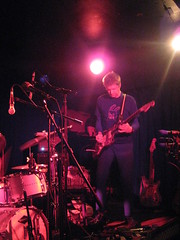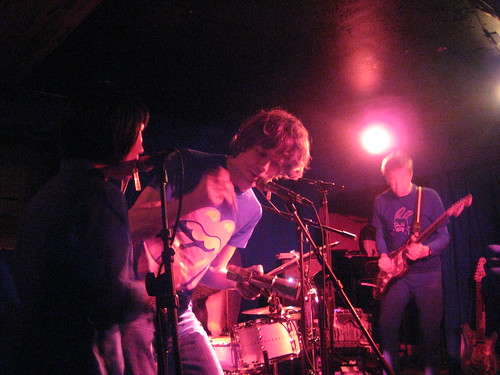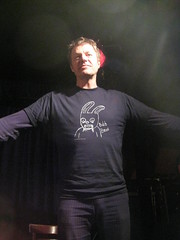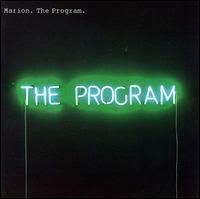 Ranchero Brothers, Largo at the Coronet, November 23, 2008: In the "Cougars" episode of 30 Rock, Liz informs Frank that he can't be gay for just one person, "unless you're a lady and you meet Ellen." (Frank: "I got some real thinking to do. It's scary ... but also exciting.")
Ranchero Brothers, Largo at the Coronet, November 23, 2008: In the "Cougars" episode of 30 Rock, Liz informs Frank that he can't be gay for just one person, "unless you're a lady and you meet Ellen." (Frank: "I got some real thinking to do. It's scary ... but also exciting.") So here's my question: Can you be alt-country for just one band?
I know the theoretical answer: Quality music shouldn't be judged by labels, and in our post-modern society, genres easily bleed into one another. Besides, that's assuming you accept those arbitrary distinctions in the first place. But as someone who's read far too many music magazines/zines/blogs in my life and aligned herself with British bands far too slavishly, it's sometimes hard to shed old habits. In addition, maybe my tastes are, in fact, circumscribed--I can admit it.
For the last several years, I've listened to more alt-country/Americana than I previously thought possible, but I'm not sure much of it took, at least not to the extent that one band did. However, I'd like to think I've opened my ears to some degree and that a nod to Nashville is no longer the kiss of death. Trust me, my attending this gig would've been unthinkable not that many years ago.
Granted, there are probably better places to test my alt-country mettle than a Rancheros Brothers gig, especially one at Largo; mixing genres is practically a mandate here. Besides, Rhett and Murry's set comprised a lot of Old 97s songs, including many Rhett performed the night before. The standouts, though, were the oddball covers ("Harold's Super Service" by Merle Haggard, for example) and unreleased tracks, such as a recording with Waylon Jennings.
As much as I dig solo singer/songwriters, Murry's backing vocals sounded especially sweet this evening, and by taking the lead, he gave Rhett's strained voice a welcome break. But Murry also delivered in a way I couldn't have guessed: He killed it. From his opening story about finding a stack of over-40 porn magazines as a teenager to detailing his family's record collection to blaming Ken from the Old 97s for certain band decisions, he was a total cut-up. I'd happily pay to see that again.
To top it all off, Jon Brion dropped by for the encore. Their first song was a Beatles cover I had seen Jon do with a whole different crew just a month ago, and the second was the Old 97s "Rollerskate Skinny," which Jon graced with a helluva piano solo. He was ready to leave the stage when Rhett asked him to stay for one more. Talk about a curveball--the final selection was a ridiculously arcane cover called "Jack the Necrophiliac," with all the implications you might imagine. Though Rhett betrayed a hint of shame during the intro to the song, they ultimately embraced the hootenanny, their manic energy suffusing the room and nearly allowing us to forget the regrettable (but catchy) lyrics.
My original question will likely go unanswered for some time, but rest assured, dear readers, that Frank was able to make peace with his situation. Witness his final conclusion: "Look, you dudes are great, a lot of fun to dance with, and you smell awesome. Enjoy your night"--words to live by.
See also:
» damn you for being so easygoing
» it took almost seven hours to sing
» i know it's today


 Perhaps my favorite song of the night came during the first set: "Thurston County," from Nels's upcoming solo record, out in February 2009. As Nels explained it, it was the name of a real place, and listening to the more laid-back passages in the tune brought to mind the exhilaration of a crisp, clear drive up the Northern California coast. That track's a winner.
Perhaps my favorite song of the night came during the first set: "Thurston County," from Nels's upcoming solo record, out in February 2009. As Nels explained it, it was the name of a real place, and listening to the more laid-back passages in the tune brought to mind the exhilaration of a crisp, clear drive up the Northern California coast. That track's a winner. Ahh, the '90s--it may have started with
Ahh, the '90s--it may have started with